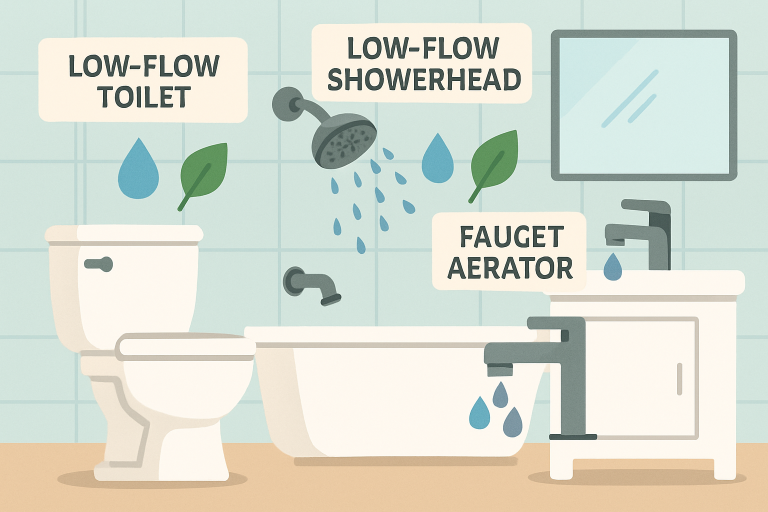Making the shift toward sustainability in our daily routines doesn’t have to be complicated. Adopting eco-friendly plumbing practices is one of the most impactful changes a homeowner can make. These upgrades reduce water and energy use and can significantly cut utility costs, making them a win for the environment and your wallet. If you want expert strategies tailored to your home, working with a trusted Kansas City plumbing company is a great way to start your journey toward greener living.
Modern homeowners can access technology and fixtures that help reduce waste while maintaining comfort. By selecting efficient appliances and sustainable building materials, your plumbing system can play a central role in lessening your ecological footprint. This article explores leading eco-friendly plumbing solutions you can implement today, guiding you to make informed, environmentally responsible choices for your home.
Water-Saving Fixtures
Updating your fixtures is the most straightforward place to reduce your home’s water use. Swapping out outdated toilets, faucets, and showerheads with new, water-saving options can have a dramatic impact:
- Low-Flow Toilets: Models released in the past decade often use just 1.28 gallons per flush, compared to pre-1992 toilets that use up to 7 gallons. These improvements can save a typical family thousands of gallons of water each year. According to the EPA, toilets are the largest source of water use in the home, amplifying the savings from this single upgrade.
- Low-Flow Showerheads: Standard showerheads can use 2.5 gallons per minute or more, but low-flow versions offer the same experience using less water, with some models cutting consumption by 50%.
- Water-Efficient Faucets: Installing faucet aerators on bathroom and kitchen taps can drop water usage from over 2 gallons per minute to just 1.5 gallons, without compromising water pressure or effectiveness.

Energy-Efficient Water Heaters
Water heating accounts for a significant portion of a home’s energy use. Upgrading to a more efficient system can translate into meaningful utility bill reductions and a much smaller carbon footprint:
- Tankless Water Heaters: Traditional water heaters store and continually heat water, while tankless models heat only what’s needed on demand. This shift can cut your water heating energy use by up to 50%.
- Solar Water Heaters: Solar energy harnesses the sun to heat water, reducing dependence on fossil fuels. Although initial setup can be costly, solar water heaters are among the most sustainable options, with long-term energy bill savings.
- Heat Pump Water Heaters: Rather than generating heat directly, these units move existing heat to the water, enjoying high efficiency and using about 60% less energy than traditional heaters.
Sustainable Piping Materials
Sustainable plumbing is not just about fixtures—it’s also about the materials in your pipes. Selecting options with a lower environmental impact can make a big difference:
- PEX (Cross-Linked Polyethylene): PEX is growing in popularity as a flexible and durable replacement for copper and PVC. Its installation requires less energy and is less prone to leaking, meaning less wasted water in the long run.
- Recycled Copper Pipes: While copper piping is lauded for longevity, mining is resource-intensive. Opting for recycled copper reduces the environmental burden while retaining the durability benefits.
- Lead-Free Pipes and Fittings: Choose modern options like stainless steel and brass that comply with today’s stricter health and safety standards, eliminating legacy lead systems’ risks and long-term pollution.
Smart Plumbing Technologies
Integrating technology into your plumbing can prevent waste and save money year-round. Consider these innovative solutions:
- Leak Detection Systems: Even small leaks can waste thousands of gallons of water over time. Smart detectors can spot these early and send alerts to your phone, enabling you to address issues before they become costly and destructive.
- Smart Water Monitors: These devices analyze your home’s water consumption in real time, offering insights, alerts, and sometimes even the ability to remotely shut off your water supply in emergencies.
- Touchless Faucets: Popular in kitchens and bathrooms, these prevent water from running when not actively in use, dramatically reducing unnecessary waste.
Greywater Recycling Systems
Greywater is gently used water from sinks, showers, and laundry machines. Rather than sending it to the sewer, greywater systems collect, filter, and redirect it for landscape irrigation and toilet flushing, conserving potable water supplies and making your home more resilient during droughts. Hope Plumbing offers more details on system benefits.
Rainwater Harvesting
With a rainwater harvesting system, you can catch and store rainwater from your roof for later use around the house. Even in regions with moderate rainfall, this can drastically lower your dependency on municipal sources—perfect for non-potable uses like watering gardens or washing vehicles.
Regular Maintenance
Even the best fixtures and systems can’t achieve peak performance without regular, proactive maintenance. Simple practices can prevent waste and prolong the life of your investments:
- Inspect pipes and appliances routinely for leaks or drips and repair them immediately.
- Clean aerators and showerheads to avoid mineral buildup and maintain pressure.
- Flush traditional water heaters once a year to clear sediment, which reduces efficiency.
- Insulate hot water pipes to retain heat and decrease energy demand for heating.
- Choose natural drain cleaners (baking soda, vinegar) over chemical products to reduce environmental harm.
By adopting eco-friendly plumbing solutions, your household actively participates in the global shift toward sustainability. Whether installing water-saving fixtures, switching to sustainable piping, integrating innovative technologies, or simply keeping your system in top shape, each step compounds environmental and financial benefits for years.
